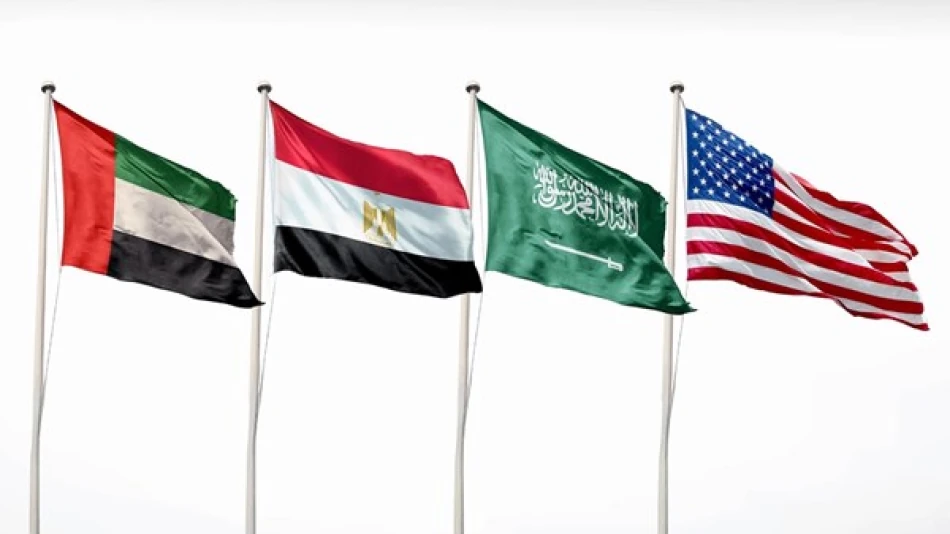
UAE, Saudi, Egypt, and US Ministers Announce Joint Statement on Restoring Peace and Security in Sudan
Four-Nation Coalition Demands End to Sudan War as Regional Security Risks Mount
The United States, UAE, Saudi Arabia, and Egypt have issued their strongest joint statement yet on Sudan's devastating conflict, calling it "the world's worst humanitarian crisis" and demanding an immediate three-month humanitarian ceasefire. The quartet's coordinated diplomatic push signals growing alarm over how the 20-month war is destabilizing the Red Sea region and creating opportunities for extremist groups to gain ground.
A Regional Security Crisis in the Making
The joint statement, released after intensive consultations led by the US State Department, reflects a fundamental shift in how regional powers view the Sudan conflict. What began as an internal power struggle between the Sudanese Armed Forces and the Rapid Support Forces has evolved into a broader threat to Red Sea maritime security and regional stability.
The timing is significant. With ongoing disruptions to Red Sea shipping routes due to Houthi attacks and the strategic importance of Sudan's coastline, the four nations appear increasingly concerned about leaving a security vacuum that hostile actors could exploit. The statement explicitly warns against allowing "destabilizing regional and local parties seeking to benefit from the continuation of the conflict in Sudan."
The Three-Month Ceasefire Gambit
The coalition's call for an initial three-month humanitarian truce represents a more structured approach than previous diplomatic efforts. Unlike earlier ceasefires that collapsed within days, this proposal includes specific timelines: immediate humanitarian access, followed by a permanent ceasefire, and then a nine-month transition to civilian government.
This phased approach mirrors successful conflict resolution models used elsewhere, but Sudan's warring parties have repeatedly violated previous agreements. The key difference now may be the coordinated pressure from four major regional players, each with significant leverage over different aspects of the conflict.
Foreign Military Support Under Scrutiny
The statement's emphasis on ending "external military support" to warring parties marks a notable diplomatic development. While not naming specific countries, this language appears directed at nations like Russia and Iran, which have been accused of providing weapons and support to various factions.
The UAE's participation in this statement is particularly significant, given that it has faced allegations of supporting the RSF through weapons supplies and logistical assistance. By signing onto calls to end external military support, Abu Dhabi may be signaling a shift toward diplomatic rather than military solutions.
Targeting the Muslim Brotherhood Network
In an unusually direct political statement, the coalition declared that Sudan's future "cannot be dictated by violent extremist groups that belong to or are documented to be affiliated with the Muslim Brotherhood." This language reflects the particular concerns of Egypt, Saudi Arabia, and the UAE, all of whom have designated the Brotherhood as a terrorist organization.
This framing suggests the four nations view the Sudan conflict through the lens of their broader regional competition with Islamist movements. It also indicates they may be preparing to exclude certain political factions from any future transitional government, potentially complicating peace negotiations.
Economic and Humanitarian Stakes
Sudan's collapse carries significant economic implications for the region. The country sits at a crucial geographic crossroads between Africa and the Middle East, with substantial agricultural potential and mineral resources including gold. Its ports provide alternative routes for regional trade, particularly important given Red Sea shipping disruptions.
For Egypt, Sudan's stability directly affects Nile River water security and refugee flows. The UAE and Saudi Arabia have invested billions in Sudanese agriculture and infrastructure projects that remain stalled. The US sees Sudan as key to counter-terrorism efforts in the Sahel region.
Diplomatic Coordination Strategy
The coalition has established a clear division of labor: Saudi Arabia and the US will continue leading the Jeddah Process focused on ceasefire negotiations, while Egypt hosts meetings of Sudanese civilian and political forces. This coordination suggests lessons learned from previous fragmented diplomatic efforts in Libya and Syria.
The agreement to reconvene at the ministerial level in September 2025 indicates a long-term commitment, but also acknowledges that any resolution will require sustained diplomatic pressure over many months.
Challenges Ahead
Despite this diplomatic momentum, significant obstacles remain. Both the Sudanese Armed Forces and RSF have made territorial gains they are reluctant to surrender. Local militias and tribal groups have proliferated, making any ceasefire enforcement extremely complex.
The coalition's success will largely depend on their ability to coordinate economic incentives and sanctions effectively. Each of the four nations maintains different relationships with Sudan's warring parties, potentially providing multiple channels for pressure and engagement.
The September 2025 ministerial meeting will serve as a crucial test of whether this four-nation approach can achieve what previous international efforts have failed to accomplish: bringing Sudan's devastating conflict to a sustainable end.
Most Viewed News

 Layla Al Mansoori
Layla Al Mansoori






